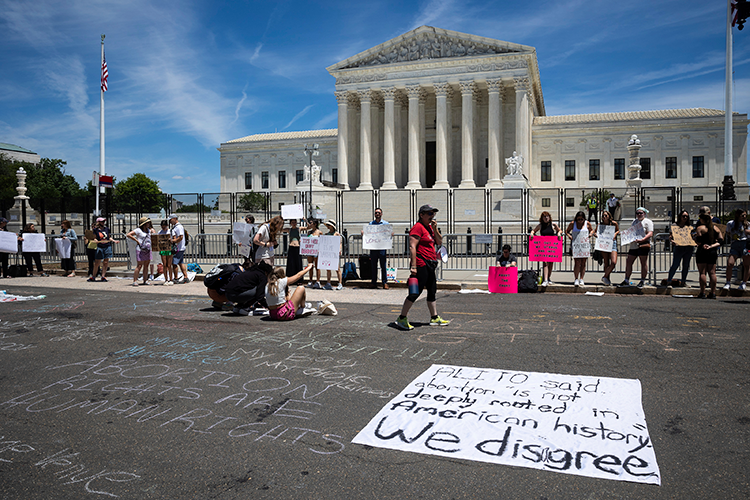In wake of Dobbs, ABA advocates for abortion, same-sex marriage and contraceptive rights

People protest the Dobbs decision at Times Square in New York City on July 4. (Photo by Ron Adar / SOPA Images/Sipa USA)(Sipa via AP Images)
In the final hours of the ABA Annual Meeting on Tuesday, the House of Delegates overwhelmingly approved six resolutions related to the U.S. Supreme Court’s recent decision to overturn Roe v. Wade.
The high court ruled on June 24 that there is no constitutional right to abortion in Dobbs v. Jackson Women’s Health Organization, a challenge to Mississippi’s ban on most abortions after 15 weeks of pregnancy.
“The Constitution makes no reference to abortion, and no such right is implicitly protected by any constitutional provision, including the one on which the defenders of Roe and Casey now chiefly rely—the due process clause of the 14th Amendment,” Justice Samuel Alito wrote in the opinion.
Roe, decided in 1973, held that states can’t ban abortions before viability, the point at which a fetus can survive outside the womb. In 1992, the Supreme Court reaffirmed this holding in Planned Parenthood v. Casey.
The Section of Civil Rights and Social Justice filed all six resolutions late last week.
ABA takes stand on penalties for helping women who seek abortions
Resolution 804 opposes establishing criminal and civil liabilities for individuals or groups that assist or support someone who is considering or seeking an abortion; procuring reproductive health care; or experiencing a miscarriage, stillbirth or adverse outcome during pregnancy.
The measure urges the repeal of existing statutes that impose criminal or civil liabilities for this conduct. It also affirms that it is not intended to affect rules, statutes or regulations that relate to medical malpractice, common law or statutory negligence.
“How many of you have a cellphone with an Uber or Lyft app?” asked Juan Thomas, the CRSJ chair-elect. “Under certain interpretations of these laws, if you pay for an Uber for someone to go to a clinic to get advice or information about abortion or reproductive choice, you could be aiding or abetting.”
“How many of you are flying somewhere today, probably back home?” Thomas added. “Under some theories of interpretation, the airline pilot who flies a young lady from, let’s say, Jackson, Mississippi, to Los Angeles, California, could be accused with aiding and abetting that young lady as she goes, perhaps, to get an abortion. This is too broad and overreaching.”
Before the Supreme Court’s decision in Dobbs, a Texas law known as SB 8 was the most restrictive abortion law in the country. After taking effect in September 2021, it prevented abortions once a doctor detects a fetal heartbeat, typically at about six weeks of pregnancy.
The law also permitted private citizens inside or outside Texas to sue abortion providers and anyone else who helps a woman obtain an abortion and potentially be awarded at least $10,000 per illegal abortion if they are successful.
The Criminal Justice Section and Coalition on Racial and Ethnic Justice also sponsored the measure.
Follow along with the ABA Journal’s coverage of the 2022 ABA Annual Meeting here.
Governmental entities shouldn’t restrict access to contraceptives, ABA House says
Resolution 805 opposes legislation and regulations that restrict the right of individuals to access contraceptives or contraceptive care. It also urges governments to enact new measures that protect these rights.
The Supreme Court ruled in Griswold v. Connecticut in 1965 that the Constitution protected the right of marital privacy against state restrictions on contraception. In 1972, the court expanded the right to use contraceptives to unmarried individuals in Eisenstadt v. Baird.
Justice Clarence Thomas joined Alito’s opinion in Dobbs, but he wrote a concurrence “to emphasize a second, more fundamental reason why there is no abortion guarantee lurking in the due process clause”—there is no basis in the Constitution for the concept of substantive due process.
Thomas called on the Supreme Court to reconsider all its substantive due process precedents, including Griswold.
“Who would have imagined that we would have to sit here and defend a woman’s right to get contraceptives or to cross state lines in order to do that?” said Mark Schickman, a CRSJ delegate to the House. “But as a result of the Dobbs decision, as a result of what’s happening in statehouses and governor’s mansions across the country, actually it is exceptionally necessary to do.”
The Criminal Justice Section and Coalition on Racial and Ethnic Justice also sponsored this resolution.
ABA advocates for protection of same-sex and interracial marriage
Resolution 806 supports the passage of the Respect for Marriage Act or other federal legislation that codifies marriage equality for same-sex and interracial couples.
Thomas, in his concurrence in Dobbs, also urged the Supreme Court to reconsider Obergefell v. Hodges, its 2015 decision that the 14th Amendment protects the right to marriage between same-sex couples.
Same-sex marriages are not protected by federal law, and according to the resolution’s report, at least 25 states still have marriage bans that could go into effect if the Supreme Court overruled Obergefell.
Resolution 806, which was co-sponsored by the Commission on Sexual Orientation and Gender Identity, also rescinds a 2004 ABA policy supporting states and territories’ ability to regulate marriage.
 Abortion-rights advocates protest outside the U.S. Supreme Court in June after the Dobbs decision. (Francis Chung/E&E News/POLITICO via AP Images)
Abortion-rights advocates protest outside the U.S. Supreme Court in June after the Dobbs decision. (Francis Chung/E&E News/POLITICO via AP Images)
Health care providers shouldn’t face criminal charges for assisting with abortions, ABA House says
Resolution 807—a companion measure to Resolution 804—opposes the criminal prosecution of physicians and health care providers who provide or attempt to provide abortions or who advise, assist, help or support someone who is having an abortion.
The resolution asks governments to repeal and oppose laws that criminalize conduct by physicians and health care providers in connection with an individual’s decision to terminate a pregnancy or receive care for pregnancy complications. It also urges them to clarify that existing laws cannot be used to prosecute physicians and providers for alleged crimes related to abortions.
In recent weeks, several states have already or plan to soon ban abortion in most cases. Of these states, 13 have so-called trigger laws—laws that were implemented in anticipation of the fall of Roe. Bans took effect immediately in some states, including Arkansas, Missouri and South Dakota.
These laws target health care providers by making abortion a felony. Some allow exceptions in cases involving rape or incest, while others only permit the procedure when necessary to prevent serious injury or death to the mother.
The Criminal Justice Section, Coalition on Racial and Ethnic Justice and Commission on Women in the Profession co-sponsored the resolution.
ABA calls on government entities to stop use of citizen lawsuits
Resolution 808 urges governments to repeal and oppose laws that provide enforcement authority and bounties to private citizens in order to “evade federal court review of the constitutionality of a law.”
Since SB 8 took effect in Texas last year, legislators have introduced at least 17 similar bills in 14 states and Puerto Rico, according to the resolution’s report.
“Another danger of this unprecedented enforcement structure is that it can be used in legislation concerning a wide range of substantive matters,” said Beth Whittenbury, the CRSJ chair.
In July, Gov. Gavin Newsom signed a bill that allows private parties to sue anyone who imports, makes, sells or distributes weapons banned for sale in California. The new law is reportedly the first in the nation to apply Texas’ citizen lawsuit model for abortions to gun sales.
“These laws invite a flood of claims that will overwhelm the judicial system,” Whittenbury said. “There is no limit on how many people can bring claims against a single defendant or how many claims can be brought. Private citizens may be encouraged to bring claims to obtain monetary awards, especially if the law criminalizes something they dislike.”
The Criminal Justice Section, Coalition on Racial and Ethnic Justice and Commission on Women in the Profession also sponsored the resolution.
ABA aims to stop the sharing of personal reproductive health information
Resolution 809 asks governmental bodies to adopt laws that prevent the disclosure of personal reproductive and sexual health information.
The measure suggests the laws require several provisions, including the completion of a privacy impact assessment before information is collected and the deletion of information when it is requested by the individual or no longer needed.
It also urges these laws to prohibit data brokers from buying, selling or disclosing personal reproductive and sexual health information and government officials or law enforcement from collecting it without a judicial order.
The Science and Technology Law Section co-sponsored the resolution.
ABA House defeats constitutional amendment advocating ‘right to life’
The House again considered an amendment to the association’s constitution that aimed to add the following as one of the ABA’s purposes: “to defend the right to life of all innocent human beings, including all those conceived but not yet born.”
Edward Haskins Jacobs, an attorney from the U.S. Virgin Islands, said he has proposed this measure for 22 years. While it had been postponed indefinitely in the past, the House voted overwhelmingly to defeat the measure on Monday.



